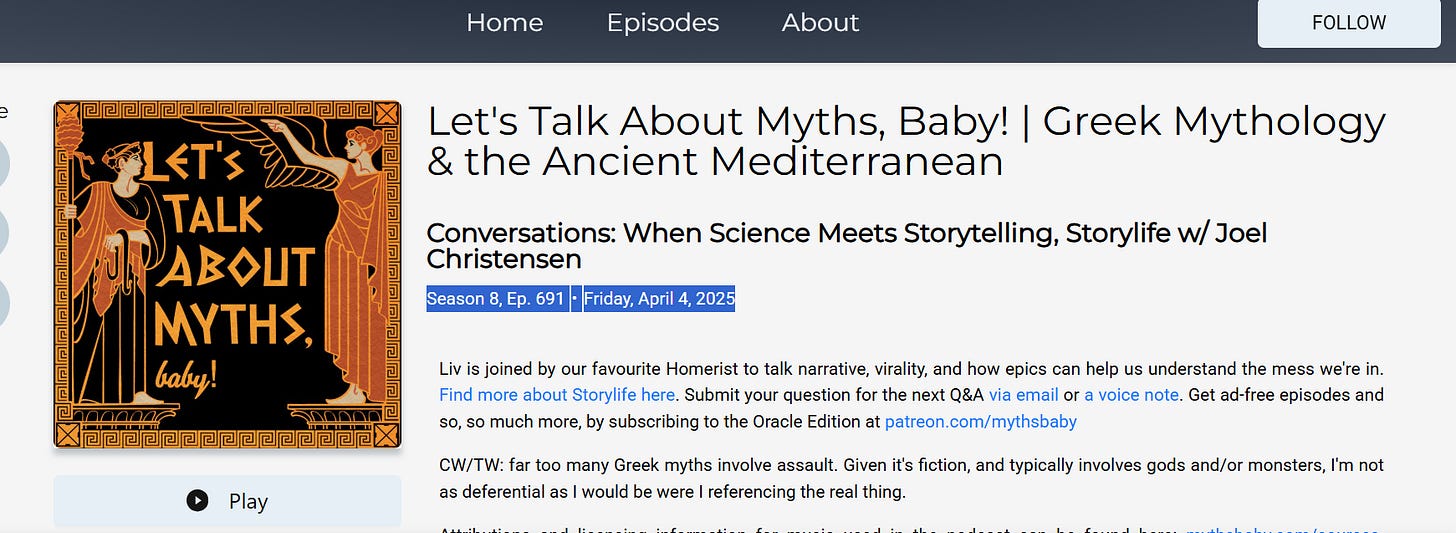This post is a continuation of my substack on the Iliad. All proceeds from the substack are donated to classics adjacent non-profits on a monthly basis. Last year this substack provided over $2k in charitable donations. Don’t forget about Storylife: On Epic, Narrative, and Living Things. Here is its amazon page. here is the link to the company doing the audiobook and here is the press page. I am happy to talk about this book in person or over zoom.
So, I published Storylife: On Epic, Narrative, and Living Things in January. I promised not to make this substack about it, but I have been remiss in promoting it (except the note at the beginning of all the posts. I have done precious little, much to the chagrin, I imagine, of my publisher! With everything going on in the world, it is hard to focus on promoting a book, even if the book speaks directly to some of the reasons the world is so messed up.
And, yet. Part of what I explore in Storylife is how narrative takes on a life of its own and how it appeals to people, not through logic or reason, but by building upon closely held beliefs about the world. People believe in stories thanks in part to basic psychological needs like belonging and a sense of agency. Look at any cultural group believing things that seem incredible or doing things that seem horrible, and they likely have a narrative that casts them as the victim, the martyr, the hero, or the misunderstood good.
This is part of what I think we can learn from Homer. None of the heroes think they’re wrong; everyone has a story that makes their actions make sense to them. Communities live or die based on their ability to create composite narratives that bring them together; this togetherness, however, is often built on degrading, undermining, or dehumanizing others. The Iliad impresses upon its audience the dangerous cost of this by presenting the Trojans as human and depicting the precarious nature of the Achaean coalition, built around a specious claim to vengeance, an extractive approach to conquest, and a super-narrative prioritizing honor and glory over human life. In a complimentary way, the Odyssey individualizes the sailors and suitors and complicates Odysseus’ homecoming to motivate the end of the heroic age and prompt questions about balancing the needs of the people and the political framework that elides the wealth of its leaders with the health of the state. (An argument I make in the last few chapters of The Many-Minded Man.).
I haven’t necessarily been paralyzed by the political and economic events of 2025. I have written a few things in Neos Kosmos about political events, most recently about a Utah Bill legislating Homer into the curriculum, Elon Musk’s absurd comments about empathy as the weakness of the ‘western tradition’, and, perhaps cleaving most closely to the spirit and concern of Storylife, a piece on how the Trump administration is redesignating the meaning of words to match its story about reality. But I haven’t been pushing the work, because it seems so small an effort in such an unending roil of crises.
Fortunately, there are others to help! The Partial Historians were kind enough to invite me to talk about the book on their podcast. Yale University Press sponsored a blog post about conspiracies that builds on the book. And, second, the audiobook format was released on February 18th. And, last week Liv Albert had me on her podcast to talk about Storylife.
If you don’t know Liv’s work, check out her work. She brings enthusiasm, insight, and humor to talking about the ancient world.






Well for my part I’m glad you did this bit of self promotion. I’ve been having a great time reading your posts on the Iliad and didn’t know there was a book! Arrived today.
My copy arrived yesterday! Very excited to spend time with the work.